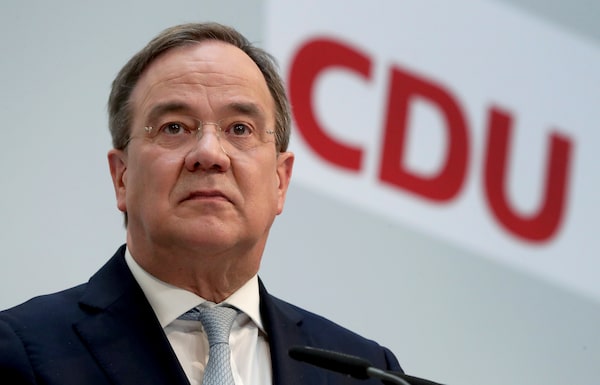
Armin Laschet, chairman of the German Christian Democratic Union, takes part in a news conference at the party's headquarters in Berlin, on March 15, 2021.Michael Sohn/The Associated Press
Two German state election defeats have jolted Chancellor Angela Merkel’s bloc, shining a spotlight on chances of it being ejected from the government in September’s national vote. A possible contender to succeed Ms. Merkel said Monday that the centre-right needs to raise its game to keep the country’s top job.
Ms. Merkel’s Christian Democratic Union was handily defeated Sunday by two popular state governors: the Green party’s Winfried Kretschmann in Baden-Wuerttemberg and the centre-left Social Democrats’ Malu Dreyer in Rhineland-Palatinate.
The CDU always faced a challenging battle against the incumbents, but the results were painful. It lost the two states by about eight percentage points. It won 24.1 per cent of the vote in Baden-Wuerttemberg and 27.7 per cent in Rhineland-Palatinate, its worst post-Second World War showing in both states.
Ms. Merkel’s federal government faces discontent over a slow start to Germany’s coronavirus vaccination drive, while most restrictions remain in place and infections are rising again. And her centre-right bloc has been hit over the past two weeks by allegations that a few lawmakers profited from deals to procure masks early in the coronavirus pandemic.
The CDU’s new leader, Armin Laschet, said Sunday’s results were “disappointing.” He said one conclusion is that “we must get better” at managing the pandemic and stressed that lawmakers must always make “the common good” their top priority.
In both states that voted Sunday, the results make three-way coalitions between the Greens, Social Democrats and pro-business Free Democrats possible – highlighting the possibility, though it has seemed a long shot so far, of such an alliance at the national level.
So far, the Union bloc of Ms. Merkel’s CDU and Bavaria’s Christian Social Union leads polls by a distance from the Greens and Social Democrats, despite softening support. But it can’t count on a popular incumbent in the Sept. 26 election for Germany’s parliament, since Ms. Merkel isn’t seeking a fifth term after nearly 16 years in power.
CSU Leader Markus Soeder and Bavaria’s Governor – along with Mr. Laschet, one of two serious contenders to be the Union’s candidate to replace Ms. Merkel – described the results as a “wake-up call.”
“One thing is clear since yesterday evening: Theoretically, there are majorities beyond the Union,” Mr. Soeder said. “So the belief or hope that 1 or 2 per cent more or less doesn’t matter, that the Union will have the chancellor in any case, is no longer 100 per cent certain since yesterday evening.”
“That means we won’t be able to get through the federal election in September in the sleeping car,” he added. “We need a clear direction, a clear strategy.”
He called for vaccinations to be stepped up and for the centre-right to offer “new people with new momentum” for the time after the election.
Mr. Laschet, who was elected as CDU Leader in January, set a more upbeat tone at a news conference in Berlin.
He insisted that Sunday’s setback for his party doesn’t affect the decision on who will run for chancellor. The Governor of North Rhine-Westphalia state said the plan for him and Mr. Soeder, who hasn’t officially declared his ambitions, to choose a candidate between Easter and late May hasn’t changed.
He called for less finger-pointing in Ms. Merkel’s current government and played down chances of a three-party coalition excluding the Union, voicing doubt that rivals would campaign for it. “We must do everything to be so strong that we have an influence on the formation of the next government,” he said.
Sunday’s votes gave the environmentalist and traditionally left-leaning Greens new confidence for the national election campaign, in which they are expected to make their first bid for the chancellery. Co-leader Annalena Baerbock said a decision on the candidate will be made “in the coming weeks.”
The Greens’ general secretary, Michael Kellner, noted that this is the first time since West Germany’s first election in 1949 that there is no incumbent seeking re-election. “The race is open and that gives us a huge opportunity,” he told ARD television.
The elections gave some comfort to the Social Democrats, currently the junior partners in Ms. Merkel’s government, who have been struggling with dismal federal poll ratings.
The Social Democrats’ candidate for chancellor, Finance Minister Olaf Scholz, said the results showed that “forming a government is possible without the CDU.”
The far-right Alternative for Germany didn’t benefit from discontent. It has opposed coronavirus restrictions and is in a court standoff with the domestic intelligence agency over whether it can be put under observation as a “suspected case” of right-wing extremism.
The party lost about a third of its support compared with strong showings in 2016, taking 9.7 per cent of the vote in Baden-Wuerttemberg and 8.3 per cent in Rhineland-Palatinate.
Our Morning Update and Evening Update newsletters are written by Globe editors, giving you a concise summary of the day’s most important headlines. Sign up today.